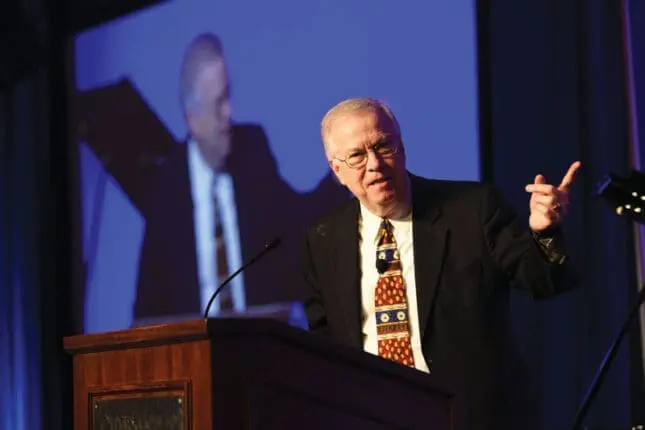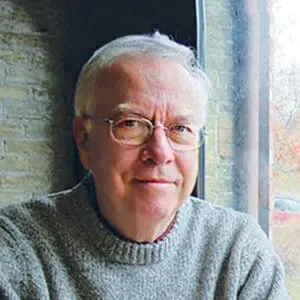Enjoy the audio preview version of this article—perfect for listening on the go.
William Doherty offered an expanded vision of therapy and outlined concrete steps therapists can take as “connectors and trust-builders” to address the stress and anxiety many clients—and therapists—are feeling in the current political climate.
In November 2016, the Age of Trump dawned, and the psychotherapy profession will never be the same—or so I hope. Nearly every therapist I know is feeling personal stress and dealing with clients whose reactions range from reliving experiences of being bullied to fears of deportation to a sense that the arc of the moral universe no long seems to bend inevitably toward justice. We’re seeing families and friendships fracture along political lines. I do know some therapists who are glad that Trump ascended to the presidency, but they, too, are concerned with the polarization in the country and the tearing of the social fabric.
This is bigger than Trump and the November election. It’s the culmination of at least two decades of increasing divisiveness in our culture and politics, where those who differ are seen as dangerous enemies, not just misguided opponents. So how do we respond as therapists and citizens? For starters, we can acknowledge that the membrane between the personal world (the traditional domain of therapy) and the public/political world has ruptured all around us.
In truth, the personal–political membrane was always a fiction, as feminist and therapists of color have long pointed out. Most of us, though, could do business as usual without inviting clients to share their reactions to what was going on in the public sphere. But now we need new tools like the ones my colleagues and I have been developing. Call them door-openers. One is to inquire, at the outset of a session, whether clients are following what’s going on in the political world right now, and if so, how it’s affecting them. The result is that many clients open up about anxieties and relationship strains they hadn’t previously shared, probably because they thought the therapy room was supposed to be a politics-free zone—as we ourselves may have believed. Another is an open letter for the waiting room or a therapist’s website. Here’s an example of a letter I’ve put out into the world:
“Dear Clients,
We’re living in troubled times. I feel it, and most people I know feel it. I’m writing this note to let you know that I’m open to talking about something not always brought up in therapy: how what’s going on in the public and political world is affecting you and your relationships, and how you’re coping.
• After a divisive presidential election, a lot of people are upset and feeling discouraged by the political infighting in this country.
• There’s great uncertainty about what the upcoming years will look like. Some people are feeling alarmed, insecure, and threatened, while others feel hopeful that necessary change will happen. And those two kinds of people are often at odds with one another.
• I see both liberal and conservative members of our community feeling as if their values are no longer acceptable in the public arena—and to some of their friends and family.
The list could go on. For now, consider yourself invited to bring your concerns about the public world into our conversations in therapy. No expectation or requirement that you do so, of course—just if you think it might be helpful.
I’m here to listen, support you, and help you figure out how to manage today’s stresses while living a life that’s in keeping with your personal and community values.”
Once clients open up, then we can help them cope with political stress just as we do any other kind of stress: through buffering methods like reducing exposure to the 24/7 news cycle, refusing to be baited by people who just want to goad them, and self-care efforts. The other kind of coping—active coping—is about helping clients enact their civic values in the world via action steps, such as getting better informed through reputable sources, donating to causes they support, volunteering to help others, getting politically active, or (as one client decided) being kinder to people in public. And when clients are having powerful, dysregulated emotional responses to the political situation, we can help them unpack how it connects to their personal journeys.
I see our job as helping clients avoid the twin dangers of being either numb/reactive or agitated/reactive in the face of political stress. The middle is where we’re aiming for ourselves and our clients: being grounded/responsive, where we’re in touch with our feelings and can act thoughtfully according to our values. Therapy like this can be an incubator for an empowered citizenry in a democracy—being neither victims nor flamethrowers.
Then there’s the world outside the consultation room. I feel passionately that we’re healers with something important to offer our neighbors and communities. In my own part of the country, I’ve been doing depolarization workshops. One stands out in particular: 13 hours over a December weekend in rural Ohio with 11 Hillary supporters and 10 Trump supporters. The goal was to learn if people could better understand their differences (beyond stereotypes) to see if there were common values and to share, if possible, something hopeful with their community and the larger world. For me, it was like couples therapy with 21 people—intense, painful, illuminating, and ultimately gratifying. At their spring reunion, the group decided to stick together and create a new kind of town hall meeting where people actually listen to one another.
In our offices, we promote the kind of personal agency that’s necessary for a self-governing, democratic people—a people whose worlds are public as well as private. We therapists are connectors, trust-builders. We understand the complexity of the human spirit. We know that embracing differences is difficult but life enhancing. If we expand our vision of therapy and the role of the citizen therapist in society, we can contribute to a flourishing democracy where people can be agents of their own lives and builders of the commonwealth.
William Doherty
William Doherty, PhD, is emeritus professor of family social science and former director of the Minnesota Couples on the Brink Project at the University of Minnesota. He is cofounder of Braver Angels and author of the book, Becoming a Citizen Therapist (with Tai Mendenhall).













